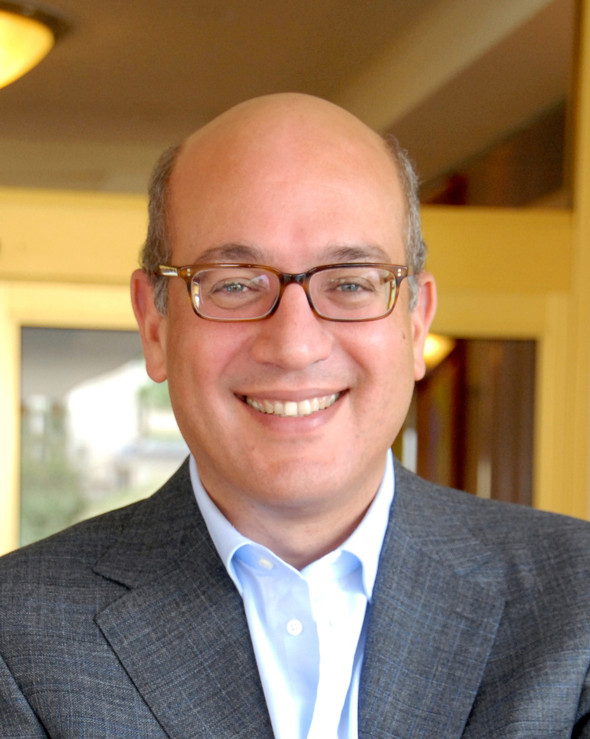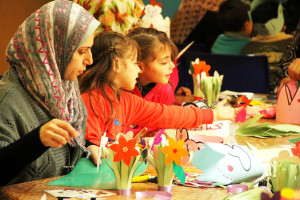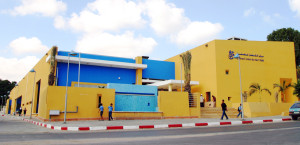Founded in 1993, the A.M. Qattan Foundation has emerged as the leading platform for arts, education and culture in the Arab world. The vast strides achieved by a primarily self-funded family foundation, which has pioneered educational development, often in the face of terrible adversity, stands out for its unwavering commitment in uplifting and promoting Arab culture. Acclaimed film maker and trustee of the A.M. Qattan Foundation, Omar Al-Qattan talks to Blue Chip about the success of the foundation in spearheading educational and cultural development in the Arab world and beyond.
Founded by Omar’s father, Abdel Mohsin Al-Qattan, a Palestinian refugee who settled in Kuwait, the foundation has undertaken remarkable work in the Middle East, often at times of violent conflict.
After fleeing Palestine, Abdel Mohsin worked in Kuwait as a schoolteacher and later became a leading player in Kuwait’s construction industry. His wife Leila was also a teacher and a Palestinian refugee. The foundation’s focus on art, music and culture was inspired by Leila’s passion for the arts. “We were brought up with a keen sense of the importance of literature and music and of the creative arts in general, thanks to her. She is an avid reader and a great lover of art, history and music, that was very much part of our family culture as well.”
In spite of their prosperity, Abdel Mohsin and Leila always remained deeply concerned about the plight of refugees, “They understood as refugees – and as many Palestinians do – the importance of education. When you are destitute and suddenly find yourself with nothing; if you have at least some qualification, you have a much better chance of surviving with dignity, and that’s proven with the Palestinians. Those who didn’t have enough of it certainly worked very hard to ensure that the next generation did. We grew up in this atmosphere, that education was the most important thing,” says Omar.
Abdel Mohsin continuously supported several educational and cultural projects. When the Gulf War started and the Al-Qattans found themselves uprooted for the third time (after fleeing Palestine, the family was also forced to leave Lebanon with the outbreak of civil war) and spent more time in Europe. It was at this time that the idea for an institutionalised philanthropic organsiation started to take shape. Drawing on the American Foundation model, Abdel Mohsin set up the A.M. Qattan Foundation in the early 90s. “My father always spoke of John Harvard and the way he created Harvard without ever visiting the United States but just by creating an endowment and recognising the importance of learning.”
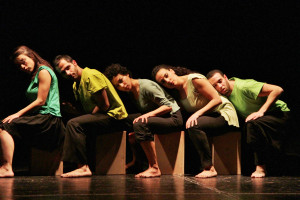
From Ordinary Madness, a dance performance by the First Ramallah Group Contemporary Dance Company, and Palestinian choreographer Farah Saleh at the Al-Kasaba Theatre and Cinematheque in Ramallah, February, 2013. This performance is supported by a grant from the Qattan Fund for the Performing Arts at the Culture and Arts Programme
Understanding the deep sense of loss for refugees and the horrors of conflict, Abdel Mohsin’s determination to set up a formal philanthropic organisation came to fruition in 1993 with the formation of the A.M Qattan Foundation.
“By the beginning of 1999 we had more a less a clear idea that we wanted to create a child focused project in Gaza and we commissioned a study to look at what sort of service we wanted to do,” says Omar. Established in 2005, the Qattan Center for the Child in Gaza has gained renown for its cultural and literacy programmes for children. Similarly the Qattan Centre for Educational Research and Development is committed to supporting Palestinian teachers in enhancing their teaching skills and developing their knowledge base. “We had workshops with international experts and friends who talked with us about what we could do to help serve the education sector in Palestine which had been badly hit by the first uprising. The pride of the Palestinians had always been education standards and we were seeing these drop very dramatically.”
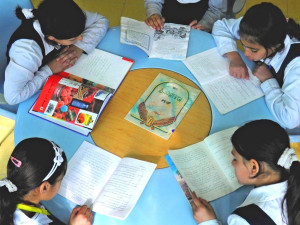
During the National Reading Week organised by the Qattan Centre for the Child in Gaza, in cooperation with the Tamer Institute for Community Education, April, 2013
The work of the A.M. Qattan Foundation has often faced terrible setbacks. For example, the Gaza Music School was completely decimated by Israeli forces in 2009. However, the school was restored in just a few months and is now part of the Edward Said National Conservatory of Music. All the foundation’s projects have continued running in spite of grave conflict and turmoil which are sadly a hallmark of life in Palestine. In fact, the foundation has also undertaken projects in the 1948 areas that are now part of Israel. Working across the Middle East, the foundation has also carried undertaken projects in Egypt, Jordan, Lebanon and Syria. “Recently we started a full-fledged cultural programme focused on Palestinian refugees in Lebanon,” says Omar. The value of the work of the foundation is particularly significant for its focus on youth in regions where young people are the major demographic.
Launched in London in 2009, the Mosaic Rooms has made a significant impact on the capital’s vibrant cultural scene, amply demonstrated in its role as the leading organisation of the Shubbak Festival established by London Mayor Boris Johnson.
Showcasing the richness and complexity of Arab cultural heritage through art, music, literature, film and education, the Mosaic Rooms is an intellectual adventure, a point of discovery, and always a richly rewarding experience. “We work in a very loose non-nationalist, cultural context,” explains Omar. However, its resonance is profoundly universal as it explores issues, conflicts and experiences that speak to everyone. Omar gives an example: “I think a space like the Mosaic Rooms, though is focused regionally, it talks about the breakdown of urban life, of the urban landscape. Whether it’s Baghdad or Aleppo which has been decimated or my home city of Beirut, or the way that modern cowboy capitalism has completely disfigured the cultural heritage of certain parts of the world – these are shared concerns, these are universal concerns. I think any self-respecting cultural project must have the ability to talk to anybody.”
Through different art forms and expressions, The Mosaic Rooms beautifully captures the issues of the moment that affect countless people including dislocation of populations caused by political convulsions, natural disasters, poverty, the sense of loss of homeland and identity, the need to articulate new ways of belonging and negotiate a legitimate stake within a wider world. “Sadly conflict and dispossession have been very much part of our experience, not just for Palestinians but for the whole region and many other regions. The experience of forced migration has increased across the world and that is very much part of the narratives we try to look at. Sadly another thing which has become much more central is civil war. While as a child I thought it was limited to Lebanon, it has now become so prevalent in the region. I think it’s definitely one of our roles, one of the roles of culture to ask: why is this happening and how can it be stopped?”
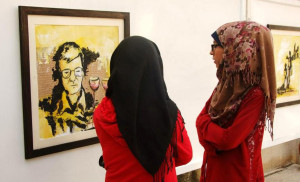
Part of the exhibition Passport by artist May Murad in Gaza, April, 2013. The exhibition includes paintings inspired by poems from the Palestinian poet Mahmoud Darwish
The work of the Mosaic Rooms is joyful, enlightening and thought provoking, often opening up the wounds of history for reevaluation, conveying history as it was lived as opposed to the official narration of history. Recognising the importance of institutions like the Mosaic Rooms, several other similar galleries opened up in London soon after. However, the Mosaic Rooms has emerged as the definitive hub for Arab culture in London. Perhaps the success of the foundation has been its embrace of a lateral structure of organisation, an approach which Omar wholeheartedly endorses: “I think of the cultural adventure as one which is much more horizontal, much more viral, much more a conversation than a hierarchy and much more a process of persuasion than a process of confrontation.” Says Omar.
The success of the A.M. Qattan Foundation shows how just a single family can enrich so manly lives across the world. The unprecedented example set by the Al-Qattan family in advancing culture and education must be emulated.



